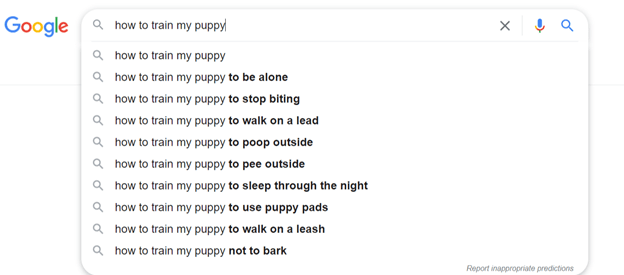What Is A Long Tail Keyword?

Hand off the toughest tasks in SEO, PPC, and content without compromising quality
Explore ServicesCreating content around your target audience is essential to performing well in search engines. If you write for your audience and answer questions they are asking search engines with high-quality content on your website, then you can hope to attract your audience to your site.
Long-tail keywords are a fantastic way for you to attract the exact customer you want. But what are long-tail keywords? How do you discover them, and how to leverage them to attract organic traffic to your site.
This is what we look at in this article.
What Is A Long Tail Keyword?
A long-tail keyword is a search phrase with higher word counts, whereas short-tail keywords only have one or two words.
The longer a search term or query, the more specific it is. Digital marketers can capture particular search traffic by targeting long-tail specific keywords.

As you can see, long-tail keywords differ from keywords in a number of ways:
- They are more specific
- They have less competition between websites
- They have a lower search volume (number of monthly searches)
- They are commonly used in voice search (think when you ask Siri “how long did Barrack Obama serve as the U.S. president?”)
The fact that long-tail queries have a relatively low search volume isn’t necessarily a bad thing.
When long-tail keyword research is done correctly and is leveraged appropriately in a comprehensive marketing strategy, website owners can find themselves on the first page of Google and other search engines in a relatively short period of time.
Why are Long-Tail Keywords Important?
Long-tail keywords are important in your SEO strategy because they allow you to target members of your target audience who are close to purchasing something – they know what they are looking for, and they want in-depth information before making a purchase.
In fact, the best landing pages have a conversion rate of around 11.45%. However, when we look at the average conversion rate for long-tail keywords, the rate is 36%! This metric highlights how even the best keyword doesn’t come close to the conversion value of leveraging long-tail search.
Even if shorter keywords have high-volume organic search, they are far more competitive, with other websites also targeting these competitive search terms. Therefore, focusing on long-tail keywords in your digital marketing efforts can attract searchers using google search without too much hassle.
Long-tail Keyword FAQ
What is a long-tail keyword examples?
Examples of long-tail keywords look like this:

They are simply extensions of search queries and questions that people ask Google. Take a look at this comprehensive list of other keywords to get a better understanding of this topic.
How do you use long-tail keywords?
Long-tail keywords are used in keyword planners to generate keyword ideas and keyword phrases, around which to create and publish high-quality content on a website as part of an SEO marketing strategy.
Choosing your long-tail keywords is an essential step in formulating an effective SEO strategy, and you can learn how to do it here.
Take the article you’re currently reading as an example. The title “What is a Long-Tail Keyword” is a long-tail keyword in and of itself. We are trying to attract people like yourself to our website by answering this question.
That is how to use long-tail keywords.
What are long-tail focus keywords?
Long-tail focus keywords are search terms that are central to a website’s SEO marketing strategy.
Creating a keyword planner and publishing calendar around long-tail focus keywords can help web admins attract the audience they want to their website.
Do long-tail keywords still work?
Yes, long-tail keywords still work. In fact, they are an essential component of any successful SEO marketing strategy.
Summary
Hopefully, this article has given you a better understanding of long-tail keywords and their role in SEO strategy.
Researching long-tail keywords and thinking about them in-depth can give you valuable insight into who your target audience is, and what they want from a website. Make sure to get your keyword research correct at the beginning of your marketing campaign – if you’d like some help, you can use this free tool to do your own keyword research, or simply reach out to us at Loganix!
Hand off the toughest tasks in SEO, PPC, and content without compromising quality
Explore ServicesWritten by Aaron Haynes on July 5, 2021
CEO and partner at Loganix, I believe in taking what you do best and sharing it with the world in the most transparent and powerful way possible. If I am not running the business, I am neck deep in client SEO.





